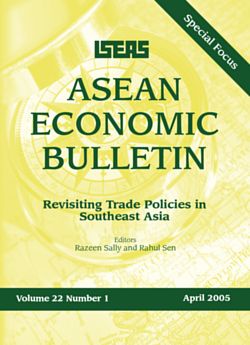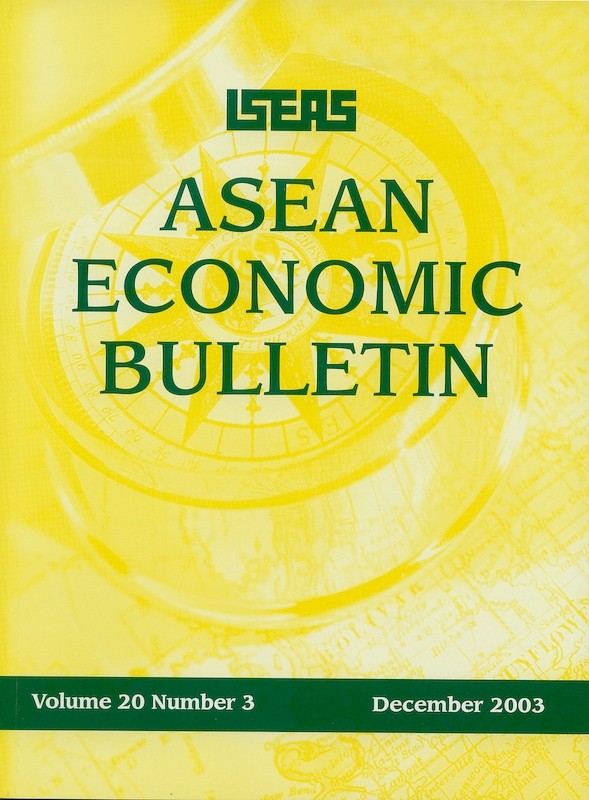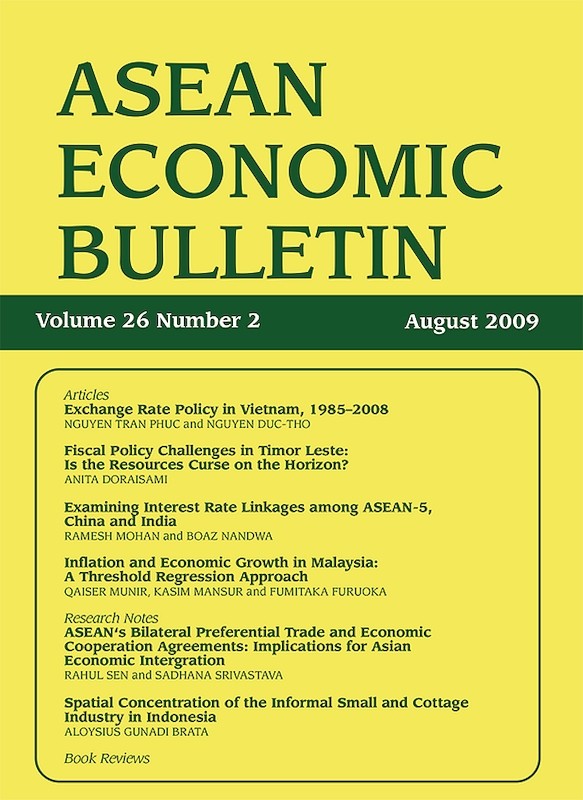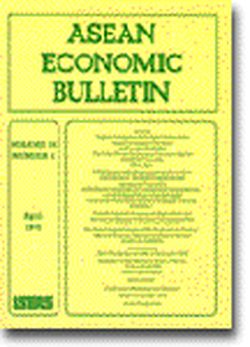ASEAN Economic Bulletin Vol. 22/1 (Apr 2005). Special Focus on "Revisiting Trade Policies in Southeast Asia"

Date of publication:
May 2005
Number of pages:
118
Code:
AE22/1
Contents
-
ASEAN Economic Bulletin Vol. 22/1 (Apr 2005). Special Focus on "Revisiting Trade Policies in Southeast Asia"
-
Preliminary pages
- ARTICLES
-
Introductory Overview: Revisiting Trade Policies in Southeast Asia, by Razeen Sally, Rahul Sen, authors
-
The Political Economy of Trade Policy in Indonesia, by Hadi Soesastro, M Chatib Basri, authors see abstractIn 1997, Indonesia was hit by an economic crisis. It forced the government to turn to the IMF and to adopt an economic recovery and reform programme, including in trade. This paper focuses on Indonesia's trade policies after the economic crisis. The paper examines the policy trends towards protection and addresses the issues of competitiveness. It also discusses Indonesia's positions in the WTO and Doha Round, and analyses its policies on and involvement in free trade agreements (FTAs), which have recently proliferated in the Asia-Pacific region. The paper concludes that FTAs have become an element of Indonesia's international economic diplomacy. However, Indonesia will negotiate FTAs only with a few major trading partners, and the policy is aimed at producing high quality agreements.
-
Trade Policy in Malaysia Liberalization Process, Structure of Protection, and Reform Agenda, by Prema-Chandra Athukorala, author see abstractThe purpose of this paper is to examine trade policy-making in Malaysia in the post-independence era with emphasis on factors underlying key policy shifts and to identify key elements of the unfinished reform agenda. The paper provides a historical overview of trade policy-making in Malaysia, paying attention to the underlying political economy, and undertakes a critical evaluation of the current trade and investment policy regime from a comparative regional perspective. It also examines Malaysia's changing policy posture relating to multilateral trade regional and bilateral trade negotiations.
-
Trade Policy in the Philippines: Treading a Cautious Path, by Jose L Tongzon, author see abstractThe Philippines has been an active supporter of the WTO and the interests of the developing countries while it is fully committed to the realization of an ASEAN economic integration. Since the mid-1980s it has undertaken major trade reforms to liberalize its trading sector and open up its economy except for sensitive areas such as agriculture and selected manufactures. The Philippines is also a keen supporter of AFTA and has fulfilled its tariff reduction commitments in time, with few exceptions. Although bilateral FTAs outside of AFTA have initially been a cause of concern, there is now a growing realization by the Philippine Government that these extra-ASEAN trade deals are practical strategies to pursue given the increasing competition in the international market. The policy-making process has been slow and cautious due to the populist nature of the Philippine Government and the adoption of an inter-agency approach to decision-making. The prospect for greater trade liberalization highly depends on whether the Philippines can overcome the current challenges facing its economy.
-
Singapore's Trade Policies: Priorities and Options, by Margaret Liang, author see abstractThis paper analyses Singapore's multi-pronged approach in pursuing multilateral, bilateral, and regional liberalization initiatives to secure and expand its political and economic space. The paper evaluates trade policy trends pre- and post-Asian crisis. It focuses on Singapore's priority interests and concerns in the Uruguay Round and its role in moving the negotiating process. Looking ahead, the paper discusses prospects in the Doha Round and what it means for Singapore. The WTO and the Doha Round negotiations remain Singapore's top priority in international trade. The paper also discusses the underlying political and strategic rationale in Singapore's pursuit of FTAs/RTAs and examines future challenges faced by Singapore in seeking greater liberalization and open markets. It is contended that strategically such FTAs have strengthened and expanded Singapore's economic linkages globally, as well as helped to anchor the economic interests of major economies beyond the region in Southeast Asia.
-
Trade Policy in Thailand: Pursuing a Dual Track Approach, by Pawin Talerngsri, Pimchanok Vonkhorporn, authors see abstractThis paper aims to review and evaluate the current trade policy of Thailand after the financial crisis, which is being pursued by the current administration. The paper summarizes the pre- and post-crisis trade policy of Thailand, sectoral trade policies, existing Uruguay Round and AFTA commitments, and institutional setting for trade policy formulation, and also discusses the recent engagements of Thailand in bilateral, regional, and multilateral fora with particular focus on her positions on the key negotiation issues in the current round of multilateral negotiations. The paper argues that having the opportunity to discuss some things more in detail under FTAs has helped clarify and crystallize some negotiating issues for Thailand. If the experience of negotiating FTAs in the past year can be of any indication on her future positions at the WTO, it is likely that Thailand will fight hard for reform on agriculture and anti-dumping, resist strongly on intellectual property rights and all-encompassing competition policy but is likely to be more accommodating on investment and possibly environment, but not labour standards.
-
Vietnam's Trade Liberalization and International Economic Integration: Evolution, Problems, and Challenges, by Vo Tri Thanh, author see abstractThis paper deals with the evolution and problems of Vietnam's trade liberalization and international economic integration during 1990-2004. First, the paper overviews the changes in Vietnam's trade regime, especially in recent years, in terms of trading rights, tariff and non-tariff barrier structure, and incentives for export promotion. Second, the commitments under the CEPT/AFTA and Vietnam-U.S. Bilateral Trade Agreement and the lessons from their implementation are examined. Third, the paper describes the progress of Vietnam's efforts to become a WTO member and attempts to answer the questions of how Vietnam can enjoy favourable conditions for accelerating its accession to WTO. Fourth, the key issues and challenges facing Vietnam during the process of further trade liberalization and integration are considered.
-
Whither Trade Policies in Southeast Asia? The Wider Asian and Global Context, by Razeen Sally, Rahul Sen, authors see abstractThis paper analyses trade policies in Southeast Asian countries in their wider Asian and global contexts. It not only compares and contrasts trade policies in individual Southeast Asian countries, but also analyses these policies in the context of regional and global economic integration, as well as the economic emergence of two other major Asian economies, China and India. The paper summarizes key trade policy features in ASEAN countries, especially to get a sense of policy variety in the region and to see how policies have changed since the 1997-98 Asian economic crisis. The paper concludes that ASEAN countries cannot rely on external tracks from above for meaningful trade policy reform. Rather they have to rely on themselves from below as it were. The engine of liberalization and regulatory reform has to be home-driven, with governments taking unilateral measures in response to internal and external conditions.





